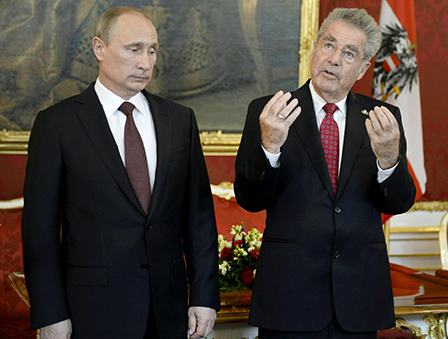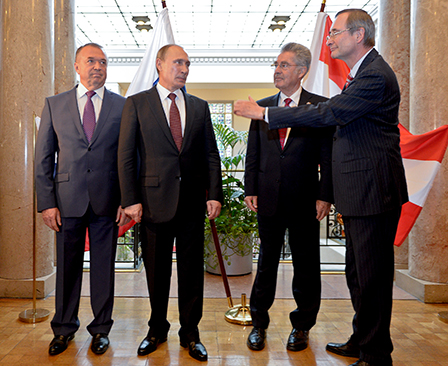Erstellt am: 25. 6. 2014 - 16:25 Uhr
An Unholy Alliance?
Austria’s decision to approve a controversial South Stream pipeline that will allow Russian gas supplied to bypass Ukraine has been met with praise from the visiting Russian President Vladimir Putin but, according to our correspondent Vanessa Mock, a mixture of “bemusement and real anger,” behind the scenes in Brussels. Only last month the European Parliament voted that South Stream should not be built.
Yesterday, the Russian energy company Gazprom and Austrian company OMV agreed to split the 200 million euro costs of building the 50-km Austrian section of the pipeline, which would carry Russian gas to the centre of Europe via Bulgaria, Serbia, Hungary and Slovenia.
Dieses Element ist nicht mehr verfügbar
Officially the EU has said it has no criticism of Austria's hosting Vladimir Putin's working trip to Austria, which was only his second to an EU country following the annexation of Crimea. The Swedish Foreign Minister Carl Brandt suggested Austria had fallen for Putin's plot to “split the European Union” but otherwise official disapproval was muted.

APA/HERBERT NEUBAUER
Perhaps leaders were reassured by Austrian Foreign Minister Sebastian Kurz's promise that Fischer would have “strong words” for Putin about his cross-border adventure in Crimea? Yet we can assume Putin was happy to hear Austrian President Heinz Fischer say he disapproved of economic sanctions because “they don’t bring profit to anybody.”
He was also reportedly delighted with the signing of the South Stream deal. After the signing Vladimir Putin hailed Austria as an "important and reliable" trade partner for his country. But Vanessa Mock says the South Stream project, “goes against everything” that Europe is trying to achieve with regards to reducing its energy dependence on Russia.
At the moment the EU gets around one third of its gas exports from Gazprom, the state-owned energy company and Mock says many in Brussels believe that that dependence meant the EU has been “held hostage” during the ongoing Ukraine crisis, it's diplomatic strength shackled by the damage that any energy fluctuations would have on European industry.
The US embassy in Austria seemed unimpressed with the visit, which came as the EU mulls over further sanctions against Russia because of its perceived support of insurgents in eastern Ukraine. The US emphasized the importance of “Trans-Atlantic unity” on the issue and urged Austria to "should consider carefully whether today's events contribute to that effort."
According to a Reuters report, it seems Putin had rather jolly time during his half day trip:
“The mood turned jovial when the head of Austria's chamber of commerce reminded Putin that part of Ukraine had belonged to Austria in 1914.
‘What is that supposed to mean? What are you proposing?’ Putin quipped, eliciting laughter from the business elite.”

APA/HERBERT NEUBAUER
Putin came to Austria and got exactly what he wanted
But is this jarring “joviality” at least in the interests of Europe, rather than just the business elite?
The head of OMV Gerhard Roiss told a news conference after the signing that "Europe needs Russian gas. Europe will need more Russian gas in future." Roiss claimed that the EU Commission was all to aware of this dependency.
Yet a new report released by the environmental lobby group Greenpeace contradicts that claim.The NGO claims that if EU-countries invested more heavily in renewables and energy efficiency the bloc could reduce its energy imports by 40% by 2030. This would help tackle climate change while also giving Europe a more free hand in international diplomacy.
"It's no secret that energy companies feed Europe's dependence on energy imports," says Greenpeace's energy and transport director Franziska Achterberg. "It's time for EU leaders to show they won't relinquish control to the oligarchs of this world."
Greenpeace Austria’s energy spokesperson Julia Kerschbaumsteiner told FM4 Reality Check today that the decision to approve the South Stream pipeline was a move in the wrong direction. She thinks the 100m euros would have been much better invested in a move towards new clean energy:
"We have to state quite clearly that with this decision to back the pipeline our dependence on energy imports and on fossil fuels has been extended for several decades."


